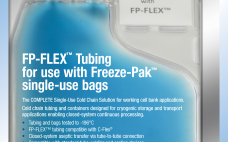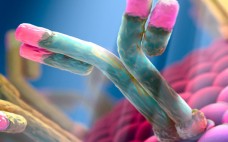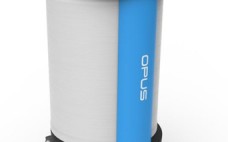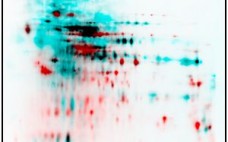This webcast features: Chris Shields, Director of Global Product Validation Services at Saint-Gobain Life Sciences. Extractable testing is traditionally performed by single-use suppliers, and while not required by industry regulations, it is the drug manufacturer’s expectation that this information form part of a product’s data package. Extractable and leachable testing is designed to determine the chemical compounds that may migrate into the customer’s fluid from the single-use product’s fluid contact layer. Extractable testing utilizes aggressive but relevant test conditions, while…
Ask the Experts
Refolding of Biopharmaceuticals by FOLDTEC: A Case Study on Recombinant Thrombin
This webcast features: Dr. Andreas Anton, Director Bioprocess Development and Dr. Sebastian Schuck, Senior Manager Business Development, Wacker Biotech While WACKER’s own technology ESETEC® has proven highly efficient in producing soluble proteins and antibody fragments via secretion, poorly soluble substances form aggregated inclusion bodies within the cell, which contain incorrectly and/or incompletely folded target proteins. Recently Wacker Biotech introduced FOLDTEC®, its novel refolding technology for bioengineered pharmaceutical proteins. With this new technology, biopharmaceuticals that tend to aggregate can be efficiently…
Development of a Novel Thermoplastic Tubing, FP-FLEX and Single-Use Freezing Bag for Working Cell Banks Enabling Closed-System Processing to Temperatures as Low as -196 °C
This webcast features: Dominic Clarke, Global Product Manager, Charter Medical Working cell banks (WCB’s) are commonly applied to initiate cell culture manufacturing campaigns for production of recombinant or therapeutic proteins. These campaigns typically begin with inoculation of cells previously cryopreserved in cryovials. While cryovials are typically used in the development of WCB’s and initiation of manufacturing campaigns, they are not optimal for the growing demands of commercial production. Cryovials are small and filling/removal is performed through an open screw cap. This…
Product Quality Assessment using N-linked Glycan Analysis by LC-MS Supports Identification of Commercially Viable Cell lines for Biopharmaceuticals
This webcast features: Gareth Meek-Brown, Lead Scientist, Lonza Biologics – Slough Product Quality assessment during Upstream and Downstream Process Development is key to the production of safe and efficacious biopharmaceuticals. Critical quality attributes such as N-linked glycosylation are highly dependent upon biosynthesis conditions and play a crucial role in the pharmacology of therapeutic proteins, potentially affecting immunogenicity, pharmacokinetics and pharmacodynamics. The presence of N-linked glycosylation has benefits including increased thermal, physical and chemical stability over aglycosylated variants. The optimum N-linked…
Optimizing Cell Culture Productivity: New Findings on the Impact of Recombinant Protein Supplements
This webcast features: Harris Grevelis, Product Manager for Upstream Technologies at Repligen Cell culture supplements are essential for long-term growth and productivity of cell lines in serum-free media formulations. Both insulin and LONG®R3 IGF-I, a more potent supplement that directly targets and activates the IGF-I receptor, are employed by the biopharmaceutical industry today to support the growth of recombinant cell lines. This webinar will show how these two supplements, used separately and in combination, impact viable cell density and IgG…
Taking Medium and Feed Development Beyond Maximizing Protein Titer to Optimizing Glycan Distribution and Simplifying Process Scale-Up
This webcast features: Serena Fries Smith, Process Science Manager, Thermo Fisher Scientific In the early 2000s when many processes were struggling to achieve 1 g/L, maximizing titers was the industry’s biggest challenge and was essential to having favorable cost of goods and an economically viable product. Over the last 10-15 years, the industry has made significant advances in media and feeds. Due to these advancements, today a standard fed-batch process can typically achieve 3 g/L and some processes are achieving…
Production Scale Prepacked Chromatography for Use with 1000 L and 2000 L Bioreactors
This webcast features: Fletcher Malcom, Associate Director of Product Management at Repligen. The technical and economic benefits of ready-to-use, pre packed chromatography columns at bench- and small-scale have been proven and documented. The question remains: how do we scale up to production-scale? Now, for the first time, the new OPUS® 45 and 60 cm columns can purify a feed stream from a 1000L – 2000L bioreactor. This Ask the Expert webcast will show how the unique design of these GMP-scale…
2D DIGE Western Blot for HCP Detection and Coverage Determination: Advantages of Fluorescence over Colorimetric Detection
This webcast features: Jamina Fiedler, Head of 2D Analytics at BioGenes GmbH. Biopharmaceutical products need to be free of contaminating host cell proteins (HCPs) prior to approval and regulatory bodies ask for a clear and manifest proof that HCP assays are fit for purpose. The colorimetric 2D Western Blot method, although widely used for HCP detection and coverage determination, has several limitations. Using examples, webinar participants will learn how the use of fluorescent dyes can help overcome these limitations to…
Increasing Protein Yield – Optimization of Suspension CHO Transient Transfection
with Dr. Laura Juckem High-efficiency transient transfections of suspension- adapted Chinese hamster ovary (CHO) cells enable researchers to bridge upstream and downstream processes. This helps to provide confidence that a recombinant protein will have the same properties throughout its development as a biologic. As drug targets become increasingly complex, proper protein folding and posttranslational modifications become more relevant. Early upstream work with the same cell type — e.g., CHO instead of HEK 293 cells — ensures similar product quality from…
Parallel Cultivation of Microorganisms – Using Rigid-Wall Single-Use Bioreactors
with Dr. Sebastian Kleebank In recent years, single-use bioreactor solutions have been successfully established for animal and human cell culture processes. Such technology is under investigation for microbial applications. Sebastian Kleebank is development and application laboratory manager for the Eppendorf line of bioprocess products. His cell culture and microbial laboratory performs parallel cultivations for prototype testing, user training, and software development. Kleebank’s Presentation “The BioBLU 1f bioreactor has a gas-inlet filter for sterile gas supply. It has a fully featured…








